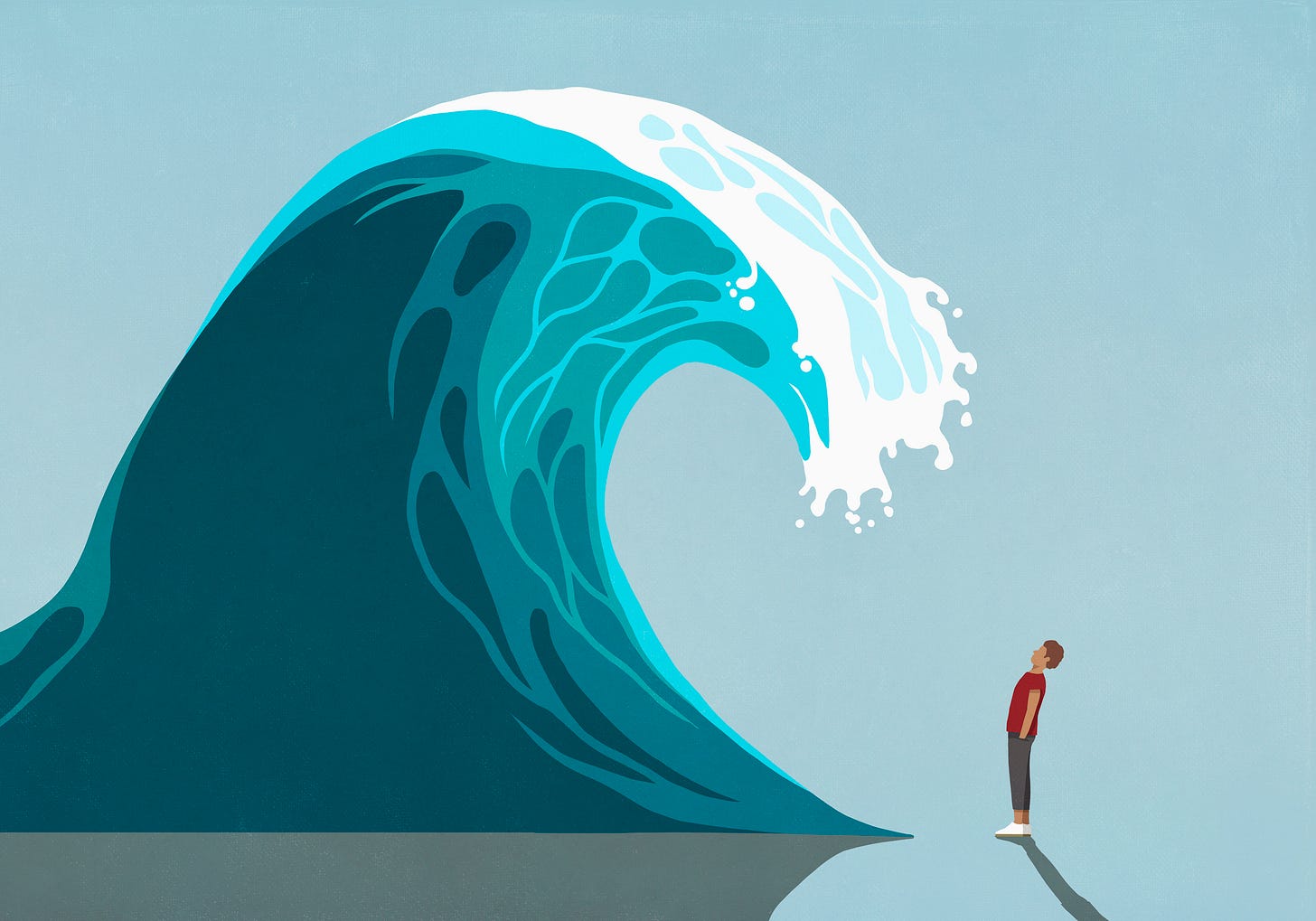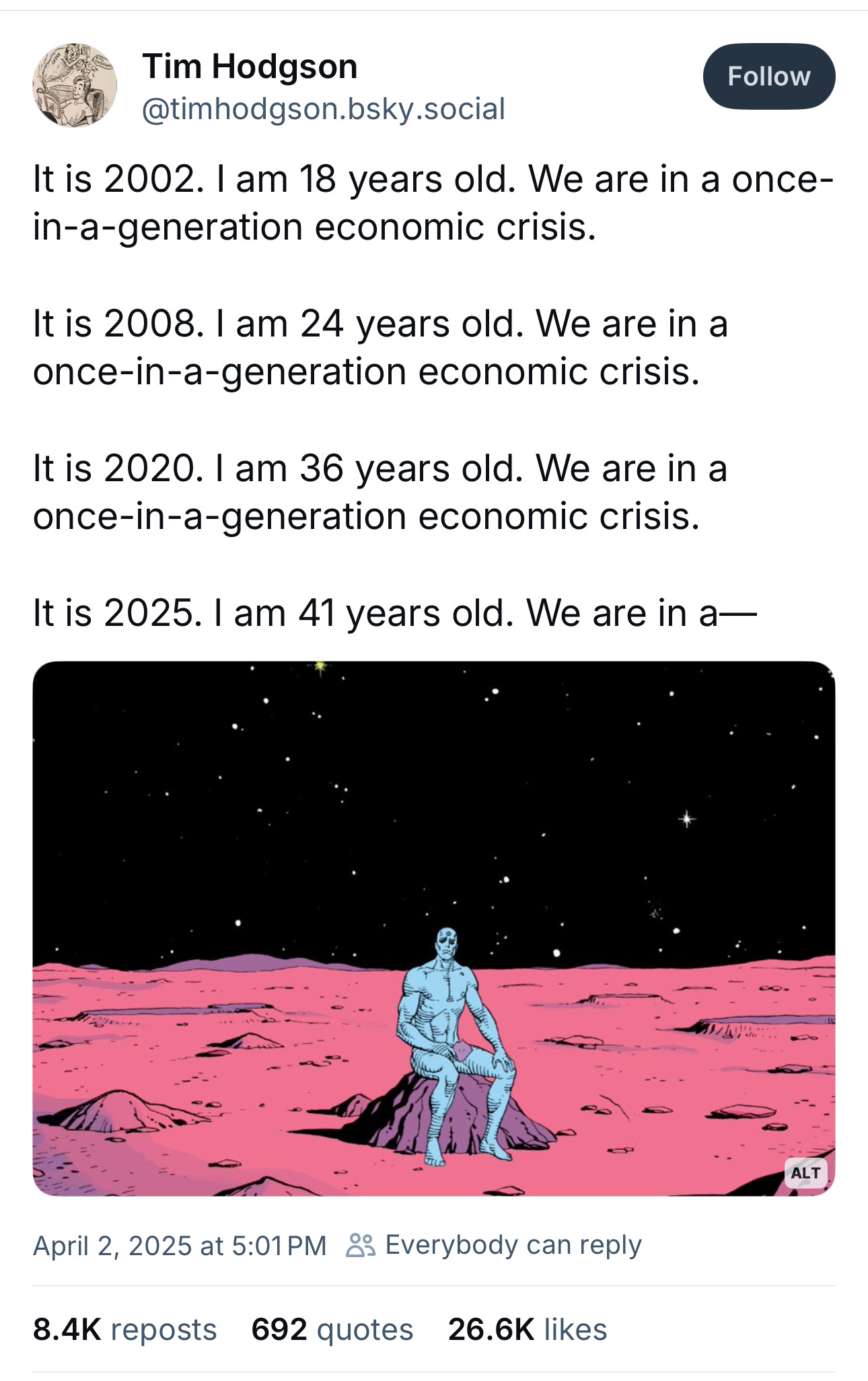I was born into a world that was always ending.
In our sweaty Texas church of fire and the end of days, we sang, “People get ready, Jesus is coming.” Our Baptist pastor preached that at any moment we’d be taken up in a divine rapture, rescued from this earth — which would burn in damnation, according to the prophecies.
The signs were there. First there was Clinton’s peace deal in the Middle East. Soon the temple would be rebuilt in Jerusalem and then the world would end. My dad showed us how Hillary Rodham Clinton’s name worked out in numerology to 666 — the mark of the beast. There would be an atomic world war. Yasser Arafat would be murdered.
The first news story I saw on the television my parents kept in the closet was in 1993, when the Waco compound was on fire, not far from where I lived in Dallas. The sound was muted, so I didn’t hear the screams, the helicopters, or the bullets. I didn’t need to. At church the next day, we were told this too was a sign. The government was coming for us, the righteous.
As you may have heard, Jesus never came. Yasser Arafat died of natural causes. Hillary was not elected. We’re all still here. And when I grew up, I left that apocalyptic faith. No more would I live in a world of eternal end, I vowed.
But I was wrong. Modern life has been an endless parade of apocalypses. There was the Y2K bug, then 9/11, then the market collapse. Then, the 2016 election with its daily horrors. Then the pandemic. Throughout all of this, there is the climate crisis. Cedar Rapids, Iowa, where I live, has experienced two historic floods since 2008. Last year an inland hurricane ripped through our town, pulling walls off apartment buildings, leveling homes, and destroying 70 percent of the tree canopy.
We live in a time of compounding disasters. Climate change. Pandemic. Financial crisis. The violence of anti-trans laws, laws that seek to erase the rights of LGBTQ people, laws that take away a person’s right to basic, lifesaving healthcare. The disaster of histories being erased. Books being banned. Our neighbors being deported.
After the derecho in 2020, I once again began to believe in the apocalypse. I put together a go bag for me and the kids. It has clothes and cash, a battery charger, a medical kit and toiletries. I wanted to be prepared.
I am not the only one preparing for the end. One of Amazon’s best-selling books is a guide to preparing your home for disaster. Joel Lambert’s self-published A Navy SEAL’s Bug-in Guide is a manual for lone-wolf survival in the face of disaster. He has recipes, suggestions for which gun to buy, tips on how to dig a trench around your home, DIY traps, self-defense techniques, and a whole section on how to hide from thermal tracking. It’s a Home Alone kind of fantasy of survival. His handbook paints a picture of a man against the evil and invading world.
On Reddit, the subreddit r/TwoXPreppers paints a different picture of survival. The forum is for women and is a trans-inclusive and LGBTQIA-friendly space. Yes, there are also suggestions for food to stockpile and which guns to buy, but its idea of prepping is more inclusive. Survival happens not only with bullets and fences, but through community.
“What are the actual scenarios in my area? What's going to be the real disaster? And when that happens, what would I realistically do? And it probably isn't a zombie apocalypse, it's probably just a weird week at someone's house.”
—Lee Arden
Lee Arden, a member of the Flyover Discord, is also interested in prepping. I reached out to Lee for their perspective when I saw they were writing a book on friendship with a chapter on prepping and community. Living in Montreal, Alden has no illusions of roughing it alone in the backwoods with a stockpile of MREs. “Realistically,” Lee told me on a Zoom call, “what's going to happen is the power will go out in my neighborhood for a week, and that will suck. So I will need to go stay with a friend in another neighborhood. So, what's going to be useful is having an overnight bag with a toothbrush and some clean underwear. Realistically, the scenario is slumber party, not starting a fire with only sticks.”
For so long, the prepper and survivalist space has been dominated by a rugged vision of off-the-grid, bootstrapping, Mad Max narrative. But real survival, realistic survival, happens through strong communities and friendships.
After all, disasters happen all the time. And they are happening with increasing frequency. Tornadoes, wildfires and hurricanes, are not far-off fantasies but realities, all heightened by the climate crisis. Apocalypse is all around us. Every time a storm is in the forecast, my friends and I check in on our group chat. Do we have gas, food, a safe place, and a caffeine plan?
Arden is preparing for disaster, but asks themself, “What are the actual scenarios in my area? What's going to be the real disaster? And when that happens, what would I realistically do? And it probably isn't a zombie apocalypse, it's probably just a weird week at someone's house.”
, who writes the newsletter , lives in Portland, Oregon, and began prepping after Kathryn Schulz’s 2015 article in the New Yorker titled “The Really Big One” laid out in vivid detail what could happen if an earthquake hit the Pacific Northwest. The article had a profound impact on how Doerr thought about disaster. Doerr has lists and resources on her website and also has a podcast that works through the nitty-gritty of food prep and the logistics of travel. When fires were raging across Southern California in January, she fielded a lot of texts and emails from friends about where to go and what to do. “For a long time, prepping was this right-wing-coded thing,” Doerr said. “But disaster affects everyone. We all need to be prepared.”Doerr does prep, but also cites research showing people who survive disasters aren’t the ones with well-barricaded fences and stockpiles of shelf-stable goods, but those with friends and strong community bonds. A billionaire’s apocalypse bunker might sound appealing, but it’s no replacement for a strong network of people who check in on you. And as Alden reminded me, “Survival in these times shouldn’t also mean misery.”
In 2020, I worked as a columnist for the local paper. In the days after the derecho, I put my phone number in the newspaper and told people to call if they needed help. For two weeks, I took calls from people who were older and lived alone. They needed a hot meal, someone to help get their car out of the garage, someone to pick up their prescription, or just someone to talk to. I picked up food and coordinated check-ins and deliveries. Meanwhile, my friends took care of me. When I was too busy to call an electrician to get the electrical box reattached to my home, a friend called in a favor and got it attached free of charge. My neighbor’s adult sons fired up their chainsaws and cleared debris from my yard.
Building a world like that in a time where people are more isolated and disconnected and alone than ever before feels harder than digging a trench around your home and stockpiling weapons. But if I know anything, it’s that disaster is already here.
An incomplete list of survival resources
It’s worth noting that the Flyover Discord that I run with
has a community of people who are really smart and knowledgeable about prepping and survival. Anyone who is a paying member of mine or Garrett’s newsletters can join in on the conversation.Lee Arden is one of those members and runs Sheer Spite Press which publishes beautiful, generous, and political books and zines. Support, Lee!
Carmen Spagnola’s Spells for the Apocalypse comes highly recommended by the Discord group and offers ways to develop emotional resilience in a world that is falling apart
Margaret Killjoy has a wonderful newsletter that also discusses prepping in a community-oriented way
Sustainable Prepping offers common sense and practical advice
Cramming for the Apocalypse is Elizabeth Doerr’s newsletter and podcast
r/TwoXPreppers is a great resource
Sarah Shay Mirk has a beautiful zine about prepping that focuses on community over individualism




My mother lost both her parents in Germany to WWII. She sat on her mother's bed as a 4 year old girl and watched her die of a disease that would have been treatable if only the German government hadn't turned all medicine and resources to the war and soldiers like her father who was killed in action on the Russian front. My father at the age of six was digging strategic bombing victims out of the rubble of apartment buildings in his Hungarian neighborhood. They fled Europe together after the war to the United States to escape mayhem and the threat of future mayhem. As I was growing up, I saw that they were paranoid hoarders and preppers because hoarders and preppers were the people that did the best in Europe during WWII. Now in their 80s they are also staunch MAGAs, fearing everything and everyone. My father owns weapons he can't lift, load or aim anymore.
How arrogant of us Americans to assume that we would be forever protected from the consequences of feeding and nurturing the most sinister of human emotions and prejudices. You can't fully hoard or prep your way out of self-inflicted economic and political catastrophe. We're kidding ourselves if we think we can.
Since the election, every day I send little love notes via FB message or text to 13 different people-- my mom, my brother, my kids, and my closest friends both near and far. It helps combat despair. It helps me feel connected and embedded in community. And if I ever don't do it, I know folks will reach out and check on me.
It's not canned goods or an extra toothbrush (though I always keep one of those in my bag), but it does feel like preparation, in addition to making now more survivable. And it only takes me 10-15 minutes every day.